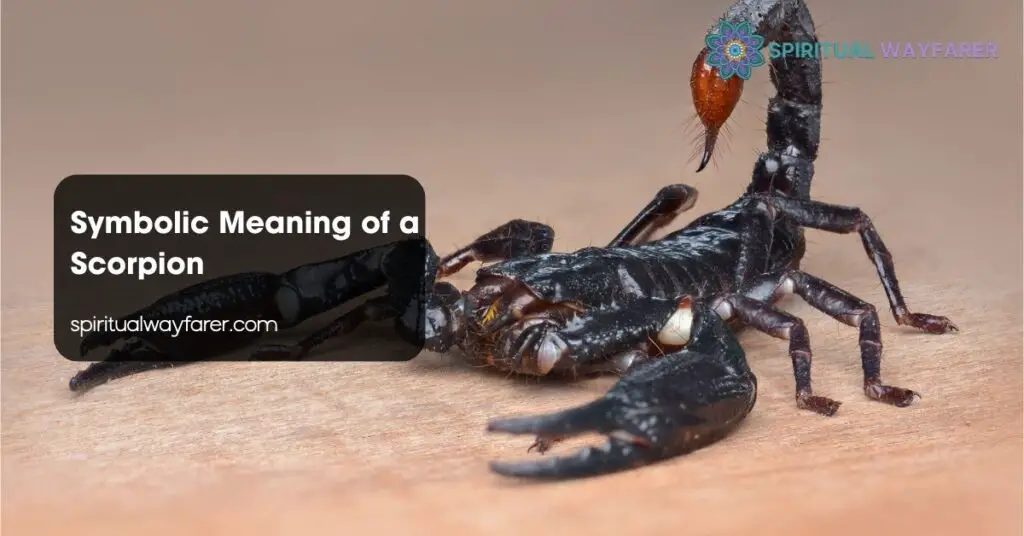Scorpions have long fascinated us with their enigmatic presence and potent symbolism. More than just creatures of the night, they embody a range of meanings that resonate deeply across different cultures and personal experiences.
We invite you to explore the rich tapestry of the scorpion’s symbolic industry. From transformation and protection to resilience and hidden strengths, understanding these themes can shed light on our own journeys and challenges. Jump into the intriguing symbolism of the scorpion and discover how its powerful imagery can inspire and guide us in meaningful ways.
The Scorpion in Mythology
Scorpions feature prominently in various mythological narratives, embodying diverse symbolic meanings. Their roles often reflect themes of protection, transformation, and power.
Ancient Egyptian Symbolism
In Ancient Egypt, scorpions served as powerful protective symbols. The goddess Serqet embodied healing and guarded against venomous creatures. Amulets and tomb decorations featured scorpion motifs to ensure safety in the afterlife. Royal regalia displayed rearing scorpions, signifying sovereignty and divine authority. Also, scorpions linked to the regenerative aspects of Egyptian spirituality, representing rebirth and resilience.
Greek and Roman Mythology
Greek myths portray scorpions as agents of punishment and protection. The tale of Orion highlights this symbolism when a giant scorpion sent by Gaia targets the hunter, leading to their placement in the stars as constellations Orion and Scorpius. In Roman lore, scorpions signified danger and divine retribution, often associated with underworld deities. They represented the peril of untamed nature and the guardianship of sacred realms. Also, scorpions influenced astrological interpretations, shaping horoscopes and celestial beliefs.
Astrological Significance
Scorpio stands as one of the most intriguing signs in astrology, embodying the essence of the scorpion’s powerful symbolism. We explore how Scorpio influences personality traits and astrological interpretations.
Scorpio Zodiac Sign
Scorpio occupies the eighth astrological house, governing individuals born between October 23 and November 21. Its symbol, the scorpion, reflects themes of transformation and resilience. Governed by Pluto and Mars, Scorpio connects deeply with the cycles of life and death, mirroring the scorpion’s role as a guardian of the underworld. This alignment endows Scorpios with a profound sense of purpose and strength.
Personality Traits
Scorpios exhibit intense and passionate characteristics, reflecting the scorpion’s fierce nature. They demonstrate remarkable resilience, handling challenges with unwavering determination. Independence defines their approach, allowing Scorpios to safeguard their personal boundaries effectively. Intelligence shines through their strategic thinking and problem-solving abilities. Also, Scorpios possess a protective instinct, much like the scorpion defending itself, ensuring their loved ones remain secure.
Cultural Interpretations
Scorpions hold important meanings across various cultures, reflecting diverse beliefs and traditions.
Eastern Symbolism
In Eastern cultures, scorpions symbolize protection and resilience. In Chinese folklore, the scorpion represents vigilance and strength, often depicted guarding temples and sacred spaces. Japanese art features scorpions as motifs of power and transformation, aligning with their ability to shed their exoskeleton. Also, in Hindu mythology, scorpions are associated with the god Shiva, embodying both creation and destruction. These representations highlight the scorpion’s role as a guardian and a symbol of enduring power.
Western Symbolism
Western interpretations of scorpions often emphasize their association with danger and transformation. In ancient Egyptian mythology, the goddess Serqet uses scorpions to protect the deceased in the afterlife, symbolizing healing and safety. Greek mythology portrays scorpions as agents of divine retribution, as seen in the story of Orion, where a scorpion is sent to punish the hunter. Besides, in astrology, the sign Scorpio embodies traits of intensity and resilience, reflecting the scorpion’s formidable nature. These meanings illustrate the scorpion’s dual role as both a protector and a formidable force in Western cultures.
Psychological Meaning
Scorpions carry important psychological symbolism that resonates with various aspects of our inner lives.
- Protection and Boundaries
Signify our innate need to establish personal boundaries, ensuring our emotional and mental well-being stays intact against external threats.
- Transformation and Growth
Represent the ongoing process of personal transformation, urging us to release outdated behaviors and adopt new, constructive habits for continuous growth.
- Resilience and Adaptation
Embody our ability to withstand and adapt to challenging circumstances, demonstrating strength and resourcefulness in adversity.
Scorpions in Art and Literature
Scorpions frequently appear in visual arts, symbolizing protection and transformation. Ancient Egyptian artists incorporated scorpion motifs in amulets, reflecting their protective role in mythology. Renaissance painters used scorpions to represent danger and divine retribution, drawing from Greek and Roman legends. In modern literature, authors employ scorpions to illustrate complex characters and themes of resilience. For example, in mythology-inspired novels, scorpions embody the duality of creation and destruction, improving narrative depth. Sculpture artists shape scorpions to emphasize their intricate form and symbolic meanings, often displaying them as guardians in public spaces. Also, contemporary graphic designers use scorpion imagery in branding to convey strength and strategic intelligence. These diverse artistic representations underscore the scorpion’s enduring significance across cultures and eras.
| Artistic Medium | Representation | Symbolism |
|---|---|---|
| Visual Arts | Amulets, sculptures | Protection, guardianship |
| Renaissance Painting | Figures embodying danger and retribution | Divine punishment, resilience |
| Literature | Complex characters, themes of transformation | Resilience, duality |
| Graphic Design | Branding elements | Strength, strategic intelligence |
Conclusion
Scorpions embody a powerful blend of strength and transformation. Their enduring symbolism across diverse cultures and contexts reflects our own journey toward resilience and self-discovery. By embracing the scorpion’s energy, we can navigate life’s challenges with confidence and insight. Understanding their symbolic significance inspires us to harness our inner strength and face the unknown with courage. Let the scorpion’s presence guide us as we continue to explore the depths of our personal and collective experiences.
Frequently Asked Questions
What is the symbolism of scorpions in different cultures?
Scorpions symbolize transformation, protection, resilience, and hidden strengths across various cultures. In Ancient Egypt, they represented healing and safety, while in Greek mythology, they embodied danger and divine retribution. Eastern traditions view scorpions as guardians and symbols of resilience. These diverse meanings highlight the scorpion’s role as both a protector and a force of transformation, offering insights into personal growth and overcoming challenges.
How are scorpions portrayed in mythology?
In mythology, scorpions hold significant roles. Ancient Egyptian mythology associates them with the goddess Serqet, symbolizing protection and healing. Greek and Roman myths depict scorpions as agents of punishment, such as in the story of Orion. These portrayals emphasize the scorpion’s dual nature of danger and protection, influencing astrological beliefs and illustrating their enduring symbolic presence in various mythological narratives.
What is the astrological significance of Scorpio?
Scorpio is a powerful astrological sign for those born between October 23 and November 21. Governed by Pluto and Mars, Scorpio symbolizes transformation and resilience. Individuals under this sign are known for their intense passion, strategic intelligence, and protective instincts. Scorpio’s connection to the cycles of life and death mirrors the scorpion’s role as a guardian, reflecting deep emotional and psychological strength in its personality traits.
How do different cultures interpret scorpions?
Cultural interpretations of scorpions vary widely. In Eastern cultures, scorpions symbolize protection and resilience, featured in Chinese temple guardians and Japanese art. Hindu mythology links them to the god Shiva, representing creation and destruction. Western cultures often emphasize danger and transformation, seen in Greek divine retribution and Egyptian protective symbols. These diverse perspectives illustrate the scorpion’s versatile role as both a guardian and a formidable force across societies.
What is the psychological symbolism of scorpions?
Psychologically, scorpions represent the need to establish personal boundaries and ensure emotional well-being. They symbolize personal transformation, encouraging the release of outdated behaviors and the adoption of new habits for growth. Additionally, scorpions embody resilience and the ability to adapt to challenging circumstances, highlighting inner strength and resourcefulness in the face of adversity.
How are scorpions represented in art and literature?
Scorpions have been a powerful symbol in art and literature throughout history. Ancient Egyptian amulets featured scorpion motifs for protection, while Renaissance artists used them to depict danger and divine retribution. In modern literature, scorpions symbolize complex characters and resilience. Sculptors and graphic designers incorporate scorpion imagery to convey strength and strategic intelligence, underscoring the scorpion’s enduring significance and multifaceted symbolism across artistic expressions.
What are the personality traits of Scorpios in astrology?
Scorpios are known for their intense and passionate nature, remarkable resilience, and strategic intelligence. They are independent and possess strong protective instincts, mirroring the fierce characteristics of the scorpion. Governed by Pluto and Mars, Scorpios connect deeply with the cycles of life and death, reflecting their ability to undergo significant personal transformations and thrive in the face of challenges.
Why are scorpions considered symbols of protection?
Scorpions are seen as symbols of protection due to their formidable nature and defensive capabilities. In Ancient Egypt, they guarded the afterlife and were associated with the goddess Serqet, ensuring safety and healing. In various cultures, scorpions protect temples, artworks, and sacred spaces. This protective symbolism extends to personal boundaries and emotional security, representing the strength to defend against external threats and maintain well-being.





















